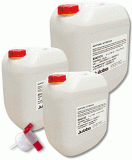When choosing a coolant for your chiller or bath, there are a few parameters to consider. The liquid chosen should be chemically compatible with the wetted part of the equipment to avoid corrosion and other damage. It should have a handleable viscosity and low enough freezing point at the desired operation temperature. Its freezing temperature needs to be significantly lower (at least 20°C) than your cooling temperature as the temperature inside the cooling equipment may be much colder than the set temperature.
When your desired cooling system require temperatures below 10°C it is not advisable to use water anymore. Instead ethanol or methanol can be used as they are non-viscous, non-corrosive, and have extremely low boiling points.
Alternatively, ethylene glycol can be used. It is more versatile than alcohols or water as it has both a low freezing temperature and a high boiling point. Furthermore, its natural freezing temperature of -12°C can be depressed to - 45°C by creating a 60% ethylene glycol and 40% water solution.
The downside is that ethylene glycol is toxic so precautions should be taken when handling, storing, and disposing of it. To circumvent this, propylene glycol can be employed instead. It has comparable thermal properties but is less toxic than ethylene glycol. It is best used in a 50/50 mixture with water. Care should be taken when heating a solution of propylene glycol as it can oxidize, forming a corrosive acid. Solutions should be replaced once they take on a reddish color.
A glycerol-water solution may also be used and while it is more viscous, it is non-toxic. A 65% glycerol / 35% water solution has a freezing point of about -37°C.
A number of commercial water-based synthetic liquids formulated specifically for use in circulators are also available (mostly from companies who manufacture circulators and chillers). These generally have many advantageous properties, such as low toxicity, low viscosity, high stability, high conductivity, low corrosion, and a wide working temperature range. However, they tend to be far more expensive. It's a "you get what you pay for" situation.

Various Julabo synthetic bath liquids are suitable for a wide range of temperature requirements.
Whatever you do, do not use automotive antifreeze. There are substances in automotive antifreeze which could damage the seals of recirculating chillers.
